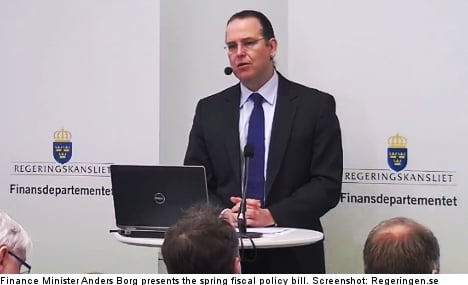“There is a strong headwind from the global economy, which is holding back the recovery in Sweden,” Borg said in a statement.
According to the latest government forecasts, the Swedish economy is expected to grow at 1.2 percent in 2013 before creeping up to 2.2 percent next year and 3.6 percent in 2015.
Unemployment, meanwhile, is expected to reach 8.3 percent in 2013, rising to 8.4 percent next year before dropping to 8.1 percent in 2015.
“We have weak, slow, and difficult years ahead of us,” Borg told the Aftonbladet newspaper.
The new figures mark a significant downgrade from the government’s last economic prognosis released in December, which forecast 2014 growth of 3.0 percent, while the jobless rate was expected to peak at 8.3 percent next year before falling to 7.4 percent in 2015.
Borg said that Sweden is in the middle of a nine-year period of sluggish economic growth that began back in 2008.
“Our strong position and the confidence in Sweden’s public finances are making it possible to proceed with more measures to mitigate the impact of the international crisis on the labour market and support a gradual recovery,” said Borg.
Sweden plans to spend 3 billion kronor ($470 million) in 2013 and 2014 to combat unemployment, adding that the final budget bill to be presented in the autumn may contain “some room” for additional spending.
“The government’s goal is to strengthen the public finances as the economy recovers so as to achieve the surplus target. We will not deviate from this objective,” said Borg.
According to Monday’s figures, the government expects Sweden’s public debt to reach 1.6 percent of GDP in 2013 before falling to 1.0 percent next year. The government expects Sweden’s budget to reach balance in 2015.
Household consumption is seen as a key driver for the Swedish economy, with the government warning that a higher than estimated savings rate could negatively affect the country’s economic recovery.
“If household behaviour proves to be different and savings remain at a high level, Sweden’s economic recovery could be more drawn out than what’s expected in the forecast, with higher unemployment as a result,” the government said in a statement.
Erica Blomgren, analyst at bank SEB, said the government’s previous growth forecast from the autumn was “too optimistic”, while the current forecast was “more in line” with that of the central bank.
Sweden will hold legislative elections in September 2014, when the left-wing opposition, headed by Social Democrat leader Stefan Löfven, hopes to wrestle power from the centre-right government in power since 2006.
In a speech Friday, Löfven promised that if the Social Democrats were to win the elections, they would bring the unemployment rate down to 4.7 percent by 2020.
“The government has failed on the jobs front, and Sweden today has higher unemployment than comparable countries in the European Union,” Löfven lamented, citing eurozone countries such as Austria, Belgium, Finland and the Netherlands.
Until September last year, Prime Minister Fredrik Reinfeldt’s government had aimed to have a budget surplus in 2013.
According to Monday’s forecasts, public debt is expected to climb to 42 percent of gross domestic product this year, compared to 38.2 percent in 2012.
TT/AFP/The Local/dl



 Please whitelist us to continue reading.
Please whitelist us to continue reading.
Member comments